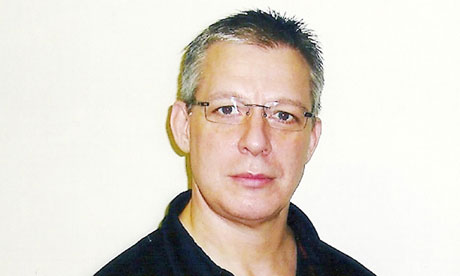
Jeremy Bamber, whose convictions for murdering five of his relatives more than 25 years ago will not be referred to the court of appeal. Photograph: Andrew Hunter/PA
Jeremy Bamber, who has spent 24 years in jail convicted of murdering five members of his family, a crime he has always denied, has lost his latest attempt to prove his innocence.
A panel from the Criminal Cases Review Commission (CCRC) ruled it would not refer Bamber's case back to the court of appeal. His lawyers plan to appeal.
In January last year Bamber's legal team submitted a lengthy dossier to the CCRC including a report from a photographic expert, which claimed that scratch marks allegedly made by a silencer attached to the rifle used to kill the family were made weeks after the deaths, contrary to evidence presented to the jury.
The dossier argues that Bamber's sister, Sheila, had killed their adoptive mother and father and her six-year old twin boys, before shooting herself.
Bamber told a member of his campaign team, who passed the comments on to the Guardian, that he was "totally stunned".
He said: "I will study the reasons the CCRC have given for not referring and will be speaking to my lawyer with a view to mounting a legal challenge to their decision. We have given the CCRC a mountain of evidence pointing to my innocence and they have rejected it.
"The truth is out, but I remain a prisoner. We are not going to stop fighting and I will be free one day."
Bamber was convicted of shooting June and Nevill Bamber, Sheila Caffell and her sons, Daniel and Nicholas, at their farmhouse in Tolleshunt D'Arcy, Essex, in August 1985. He was given a whole life tariff after being convicted of the murders in October 1986. He has twice lost appeals against conviction, and an appeal against the whole life term.
The former Conservative MP Andrew Hunter, who took up Bamber's case in parliament and acts as a spokesman for him, said he was "profoundly disappointed and very greatly surprised".
"I think the CCRC will come in for some very negative criticism for this decision. There have been so many disappointments over the years that we were not taking anything for granted ... but we really did hope this time it would be different. We have the evidence to acquit Jeremy. It's a disastrous decision."
Bamber said the CCRC's decision was "all the more perverse" given the commission's refusal to grant more time for new forensic evidence to be presented. This, he said, could prove that his sister died while he was already outside the house talking to police.
The CCRC said it had sent Bamber and his legal team an 89-page document detailing the commission's analysis of the case and the reasons for the decision.
The commission said this expressed its "provisional conclusions on all the major points and arguments raised by Mr Bamber and his team during this and earlier reviews in relation to the safety of his 1985 murder convictions".
The CCRC said Bamber and his team had been given an extra three months to respond, "given the lengthy and highly complex nature of the case".
Essex police said it had co-operated with the CCRC and had no further comment to make at this time.
http://www.guardian.co.uk/uk/2011/feb/11/jeremy-bamber-loses-chance-appeal
